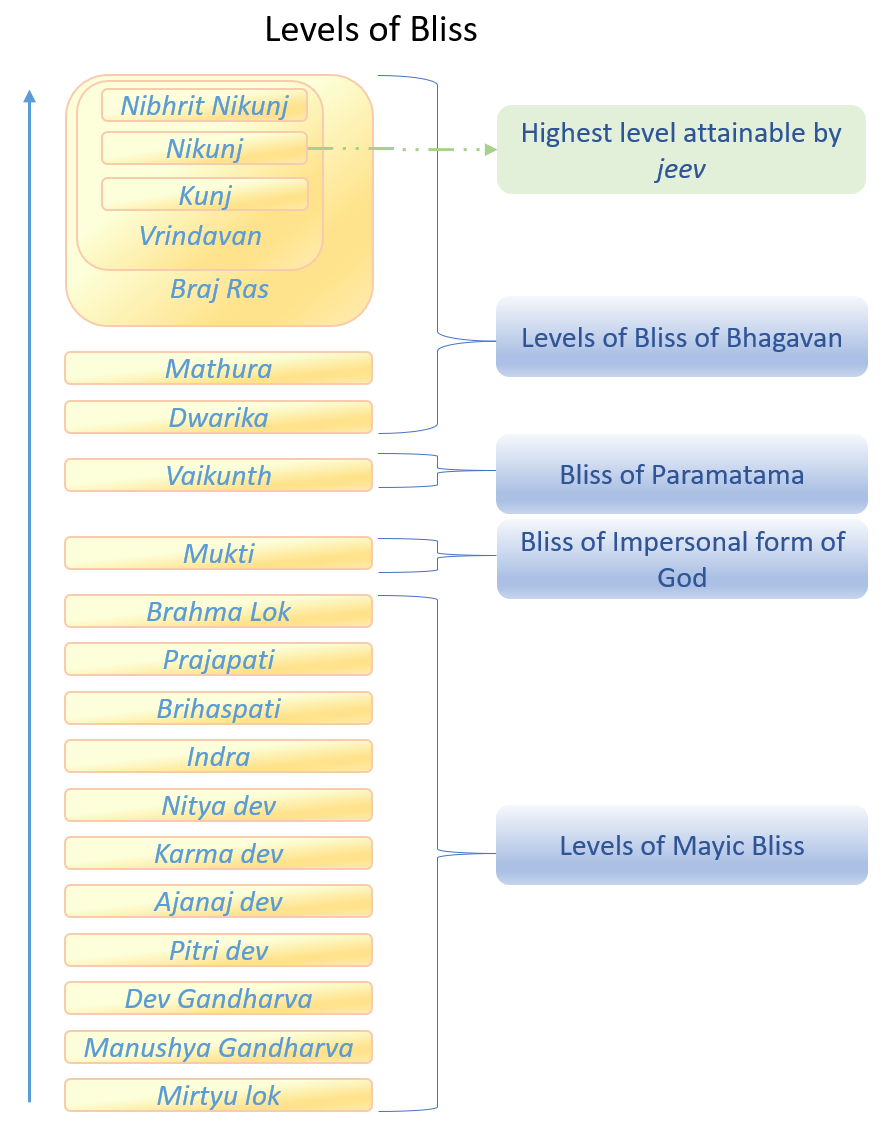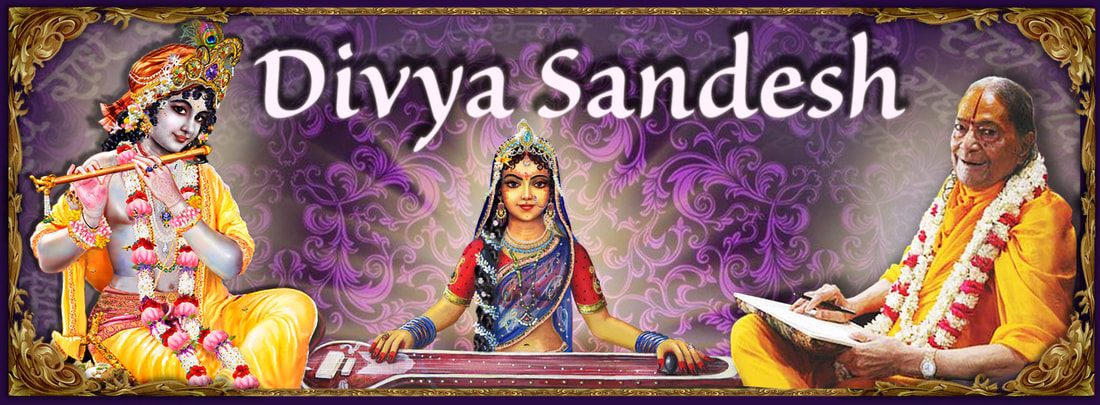Sanskrit word for bliss is Anand. The Vedas say
यो वै भूमा तत्सुखम्
Yō vai bhūmā tatsukhaṁ
Yō vai bhūmā tatsukhaṁ
Anand is the original name of God because it is an indication of the true nature of God. In other words bliss (आनंद) is not a property or one of the attributes of God, but the name of His personality. Just as light and sensation of heat are the nature of fire; They do not come from "something else". Hence the Vedas define God as
आन्नदो ब्रह्मेति व्यजानात्
Ānnadō brahmēti vyajānāt
Ānnadō brahmēti vyajānāt
"God is Anand". There is nothing in His being except Anand. As the Vedas declare:
आनंद एवाधस्तात् आनंद उपरिष्टात आनंद पुरस्तात् आनंद उत्तऱतः आनंद दक्षिणतः आनंद एवेदॅ्सर्वम्।
Ānanda ēvādhastāt ānanda upariṣṭāta ānanda purastāt ānanda uttaṟataḥ ānanda dakṣiṇataḥ ānanda ēvēdĕsarvam.
आनंद चिन्मयदुज्वलविग्रहस्य गोविन्दमादिपुरुषं तमहं भजामि।। ब्र सं.
Ānanda cinmayadujvalavigrahasya gōvindamādipuruṣaṁ tamahaṁ
आनंदमात्रकरपादमखोदरादिः।
Ānandamātrakarapādamakhōdarādiḥ.
Ānanda ēvādhastāt ānanda upariṣṭāta ānanda purastāt ānanda uttaṟataḥ ānanda dakṣiṇataḥ ānanda ēvēdĕsarvam.
आनंद चिन्मयदुज्वलविग्रहस्य गोविन्दमादिपुरुषं तमहं भजामि।। ब्र सं.
Ānanda cinmayadujvalavigrahasya gōvindamādipuruṣaṁ tamahaṁ
आनंदमात्रकरपादमखोदरादिः।
Ānandamātrakarapādamakhōdarādiḥ.
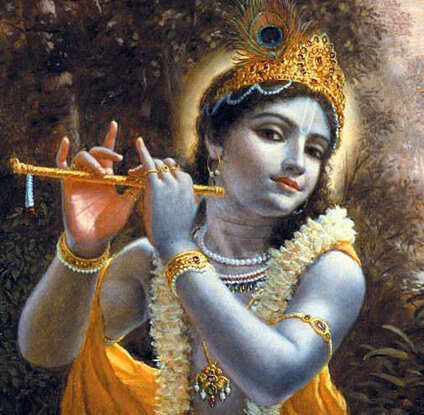 Body of Shri Krishna is not made with inert material elements like other material bodies
Body of Shri Krishna is not made with inert material elements like other material bodies
All these hymns of Veda are asserting that "His personality is made of bliss only". When He descends in a human form, it seems His body is also identical to our body. But, in composition it is completely different from our material body. He body is made up of divine bliss and nothing else.
In other words, body of Shri Krishna is not made of inert Panch Mahabhoot like other material bodies. Unlike bodies of other living beings, difference of deh (body) and dehee (one to whom the body belongs) does not exist in Shri Krishna. Not only His body is no different from Him but His abode, nature (land, air, water, sky etc.) in His abode, ornaments and other habiliments are also no different from Him. All of them are made up of Bliss only. But to play divine pastimes, He presents them in disguise to look similar to the other material forms.
The bodies of celestial beings (devi / devata) are material but are not composed of blood, bones, veins, flesh etc. Their body is ethereal (तेज). Then who can describe the composition of the divine body of Shri Krishna!
There are other kinds of material bodies as we know them. Some are created by merely touching a women. Others are formed by seeing a woman e.g. Pandu, Dhritrashtra were born by mere sight of Ved Vyas. There is also one specific kind of human body, called Nirman Shareer. At the end of his lifetime a yogi can turns his present body into ashes and creates a new body for himself to pursue his yogic journey. But that is also material body.
So, only the body of God is divine, and also God provides a divine body to His devotees in His divine abode Golok. At the time of God realization trisharir cease to exist and God gives a divine body to the jeev.
In other words, body of Shri Krishna is not made of inert Panch Mahabhoot like other material bodies. Unlike bodies of other living beings, difference of deh (body) and dehee (one to whom the body belongs) does not exist in Shri Krishna. Not only His body is no different from Him but His abode, nature (land, air, water, sky etc.) in His abode, ornaments and other habiliments are also no different from Him. All of them are made up of Bliss only. But to play divine pastimes, He presents them in disguise to look similar to the other material forms.
The bodies of celestial beings (devi / devata) are material but are not composed of blood, bones, veins, flesh etc. Their body is ethereal (तेज). Then who can describe the composition of the divine body of Shri Krishna!
There are other kinds of material bodies as we know them. Some are created by merely touching a women. Others are formed by seeing a woman e.g. Pandu, Dhritrashtra were born by mere sight of Ved Vyas. There is also one specific kind of human body, called Nirman Shareer. At the end of his lifetime a yogi can turns his present body into ashes and creates a new body for himself to pursue his yogic journey. But that is also material body.
So, only the body of God is divine, and also God provides a divine body to His devotees in His divine abode Golok. At the time of God realization trisharir cease to exist and God gives a divine body to the jeev.
Although, there are many other levels of bliss in this material world and those are also referred to as ‘Anand’ but they should not be confused with divine bliss. As the Vedas declare -
सैषानंदस्य मीमांसा भवति। युवा स्यात्साधु युवाध्ययाकः।
आशिष्ठो दृढ़ष्ठो बलिष्ठो तस्येयं सर्वा पृथिवी वित्तस्य पूर्णा स्यात्।
स एको मानुष आनंदः ।।
Saiṣānandasya mīmānsā bhavati. Yuvā syātsādhu yuvādhyayākaḥ.
Āśiṣṭhō dr̥ṛhaṣṭhō baliṣṭhō tasyēyaṁ sarvā pr̥thivī vittasya pūrṇā syāt.
Sa ēkō mānuṣa ānandaḥ.
आशिष्ठो दृढ़ष्ठो बलिष्ठो तस्येयं सर्वा पृथिवी वित्तस्य पूर्णा स्यात्।
स एको मानुष आनंदः ।।
Saiṣānandasya mīmānsā bhavati. Yuvā syātsādhu yuvādhyayākaḥ.
Āśiṣṭhō dr̥ṛhaṣṭhō baliṣṭhō tasyēyaṁ sarvā pr̥thivī vittasya pūrṇā syāt.
Sa ēkō mānuṣa ānandaḥ.
"The sole ruler of the entire earth (mrityu lok), who is young, kind, educated, respected, and whose earth is rich in crops and wealth would be considered the happiest of all men."
|
But thousand times higher than this highest happiness of the earth is the happiness of the planet of Manushya-Gandhava. Likewise, the happiness of the planets of Dev Gandharva, Pitri-dev, Ajanaj-dev, Karma dev, Nitya dev, Indra dev, Brihaspati, Prajapati and Brahma (creator) are correspondingly thousand times more than the previous one.
आब्रह्मभुवनाल्लोकाःपुनरावर्तिनोर्जुन।
गीता 8.16
Ābrahmabhuvanāllōkāḥ punarāvartinōrjuna.
Gītā 8.16
"But, even after enjoying the luxuries of the abode of Brahma, which is highest among all the other material planets, one has to return to the cycle of birth and death". And the pursuit of bliss will continue.
यत्पृथिव्यां व्रीहि यवं हिरण्यं पशवस्त्रियः। नालमेकस्य पर्याप्तं तस्मात्तृष्णां परित्यजेत् ।।
भा
Yatpr̥thivyāṁ vrīhi yavaṁ hiraṇyaṁ paśavastriyaḥ.
Nālamēkasya paryāptaṁ tasmāttr̥ṣṇāṁ parityajēt Bhā
|
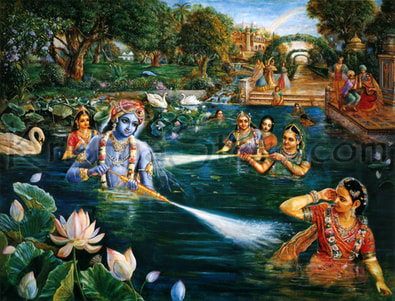 Shri Radha Krishna frolicking with Gopis in Kunj
Shri Radha Krishna frolicking with Gopis in Kunj
"Even if one were to get the luxuries of the entire , still the desires will remain as unfulfilled as they are today".
According to Vedas the true happiness (or joy, bliss, anand) has following traits:
According to Vedas the true happiness (or joy, bliss, anand) has following traits:
- Unlimited: no other bliss surpasses it in magnitude
- Eternal: it does not cease one day
- Ever new: it always feels new and never goes stale
- Ever increasing: constantly increases in magnitude
- Conscious: it is not inert, instead it is alive and sentient
- Omniscient: it is all knowing
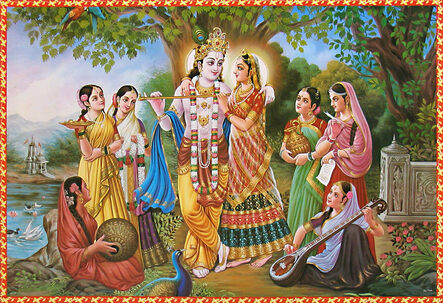 In Nikunj Asht Mahasakhi (alongwith jeev graced by them) can serve Shri Radha Krishna
In Nikunj Asht Mahasakhi (alongwith jeev graced by them) can serve Shri Radha Krishna
Where as worldly happiness is characterized as
There are many levels of bliss. We can divide them into two – Material and Spiritual (divine). The happiness from this mortal world (mrityu lok) to the abode of Brahma is material. Spiritual happiness starts from Mukti. Yet according to Jagadguru Shri Kripalu Ji Maharaj happiness of liberation is also not the area of happiness since liberation means eternal freedom from Maya and thus freedom from miseries.
- Limited: reduction of misery is meant as happiness in the cosmic world
- Temporary: the miseries overcome the worldly happiness after a while
- Ever diminishing: extended enjoyment of the object reduces the desire for enjoying it
There are many levels of bliss. We can divide them into two – Material and Spiritual (divine). The happiness from this mortal world (mrityu lok) to the abode of Brahma is material. Spiritual happiness starts from Mukti. Yet according to Jagadguru Shri Kripalu Ji Maharaj happiness of liberation is also not the area of happiness since liberation means eternal freedom from Maya and thus freedom from miseries.
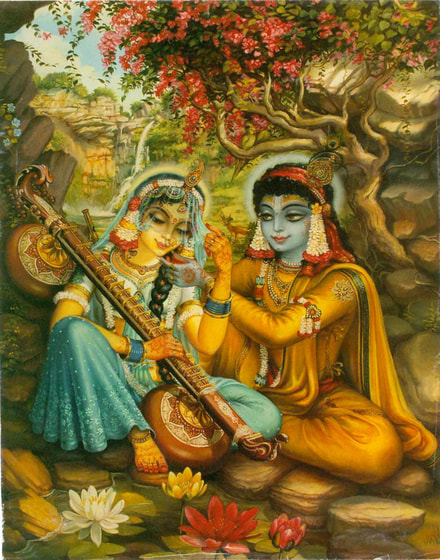 Only Shri Radha Krishna can enter Nibhrit Nikunj
Only Shri Radha Krishna can enter Nibhrit Nikunj
After liberation the individual soul merges into Supreme God, who is Infinite Ocean of bliss. Since the enjoyer became one with the object of enjoyment, the enjoyer can no longer enjoy bliss.
Then this bliss also ascends to the levels of Kunj (grove), Nikunj (dense groves) and Nibhrit Nikunj (unapproachable groves).
We can attain or have the glimpses of any level of bliss by the grace of a genuine saint of the same level. Therefore, a wise person should aim for the highest level of bliss and surrender to a Rasik saint of that desired caliber.
- Thus, the realm of happiness starts from Baikunth. However, here the Divine Majesty is dominant.
- Nectar of Dwarika and Mathura are increasingly higher than that of Baikunth as well. They have increasing levels of sweetness.
- But the levels of love-bliss, which is most adorable, starts from the love-bliss of divine Vrindaban.
Then this bliss also ascends to the levels of Kunj (grove), Nikunj (dense groves) and Nibhrit Nikunj (unapproachable groves).
- Kunj (grove) : sakhis (girlfriends of Shri Radha) and sakhas (cowherd friends of Shri Krishna) can serve and enjoy the pastimes of Shri Radha and Shri Krishna.
- Nikunj (dense groves) : In Nikunj Ashta Maha Sakhi along with those Jeev who are surrendered to these Ashta Maha Sakhi can serve Shri Radha Krishna.
- Nibhrit Nikunj is the place of most intimate pastimes of the divine couple Shri Radha Krishna where even the Ashta Maha Sakhis cannot reach.
We can attain or have the glimpses of any level of bliss by the grace of a genuine saint of the same level. Therefore, a wise person should aim for the highest level of bliss and surrender to a Rasik saint of that desired caliber.

